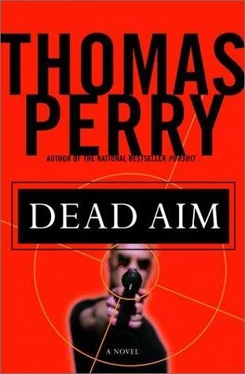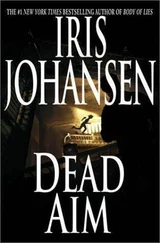Thomas Perry - Dead Aim
Здесь есть возможность читать онлайн «Thomas Perry - Dead Aim» весь текст электронной книги совершенно бесплатно (целиком полную версию без сокращений). В некоторых случаях можно слушать аудио, скачать через торрент в формате fb2 и присутствует краткое содержание. Жанр: Триллер, на английском языке. Описание произведения, (предисловие) а так же отзывы посетителей доступны на портале библиотеки ЛибКат.
- Название:Dead Aim
- Автор:
- Жанр:
- Год:неизвестен
- ISBN:нет данных
- Рейтинг книги:4 / 5. Голосов: 1
-
Избранное:Добавить в избранное
- Отзывы:
-
Ваша оценка:
- 80
- 1
- 2
- 3
- 4
- 5
Dead Aim: краткое содержание, описание и аннотация
Предлагаем к чтению аннотацию, описание, краткое содержание или предисловие (зависит от того, что написал сам автор книги «Dead Aim»). Если вы не нашли необходимую информацию о книге — напишите в комментариях, мы постараемся отыскать её.
Dead Aim — читать онлайн бесплатно полную книгу (весь текст) целиком
Ниже представлен текст книги, разбитый по страницам. Система сохранения места последней прочитанной страницы, позволяет с удобством читать онлайн бесплатно книгу «Dead Aim», без необходимости каждый раз заново искать на чём Вы остановились. Поставьте закладку, и сможете в любой момент перейти на страницу, на которой закончили чтение.
Интервал:
Закладка:
“You don’t have unlimited time,” she said. “Nobody has. It’s hard for a person who cares about you to see you obsessed with a dead woman.”
“She wasn’t dead when I met her.” Mallon paid for their dinner, and they walked along the harbor breakwall, watching the last of the boats coming in just after sundown.
“Is it the boyfriend’s murder that’s keeping you involved?” she asked. “Do you secretly think her death was a murder too?”
“I don’t know what to think,” Mallon replied. “We know she went to a self-defense school. What for? Lydia thinks she went there to learn how to kill somebody, and then did-that she killed Mark Romano herself.”
“And then what? Something drove her to suicide?”
“I don’t know. Guilt, maybe, or regret.” They walked along for a few yards, and he said, “I keep wondering about that self-defense camp. Have you heard of it?”
“I don’t think so,” she answered. “But you have to remember what kind of place Santa Barbara is. It’s always been a place where rich people came to live after they stopped doing whatever it was that made them rich-sometimes a generation or two after. And it’s drawn more than its share of strange characters of one kind or another, who have something specific in mind, some way of taking advantage of that potential. A friend of mine used to say that there are five thousand living religions, and thirty-eight hundred of them were started within a hundred miles of here. This is also one of the places you come if you want to hold a class in yoga, or start a health-food store, or push some kind of self-improvement. This self-defense school seems to me to fit into that mix-on the fringes, maybe.”
“I suppose,” he said.
They walked back to the parking lot, got into Diane’s car, and she drove him to his house. He took his suitcase, leaned in the open window on his side, and said, “Thanks for picking me up, Diane.” Then he added, “And thanks for listening to all this.”
“Thanks for dinner,” she replied. “If listening helps you get over this, I’ll listen anytime.”
“It’s not a complete waste. Lydia and I may have solved a murder.”
“And found a murderer who’s mostly a victim and who is, incidentally, dead.”
“The truth matters.”
“Some truths matter more than others. Spend your time thinking about living women. They sometimes repay your interest.” The window on Mallon’s side slid shut, and she drove off into the night.
Mallon unlocked his front door, turned on the lights, and carried his suitcase up to his bedroom. He began to unpack, hanging up the clean clothes he had packed this morning. He was frustrated. Nobody seemed to understand that what he was looking for made a difference. He was sure that the girl who had been in his house had not been seeing things in a distorted way.
She had been clear-eyed and sane. Maybe the one who killed Mark Romano had tracked her to his door, taken her out, and shot her. Maybe she had known that Mark Romano should die, had gone out and learned how to kill him, and then done it. And maybe she had discovered something he could not quite know, but suspected: that killing another human being had changed her into someone she did not want to be.
CHAPTER 14
As Stewart Markham walked along the sun-dappled path through the woods above the main lodge into the outer reaches of the self-defense camp, he could hear Coleman’s footsteps behind him. He had met Coleman here over three years ago, on his second stay at the school. Since then, they’d had the sort of relationship he’d had with a number of other men. When they didn’t happen to be around, he never thought about them, and didn’t have any impulse to stay in touch. Now and then one of them might call to mention something like a change of address or, only slightly more often, out of hope that a bout of extreme boredom would be relieved by a little cheerful banter. But whenever they were in the same place at the same time, they were instantly close friends-not merely as close as the last time but even closer, because now the friendship would have been extended by a year or two and by one additional reunion.
Stewart was forty-two now, and the number of friends who turned up like this had grown large. There were old classmates from Etheridge School in Massachusetts, others he’d known at Princeton. There were not more than two or three from his business career, maybe because Stewart had needed to endure the brokerage, to satisfy his grand father, for only five years before the old man died and could no longer change his will. The people around him in the brokerage had been a mix of women, men too old to share his interests, and foreigners.
Marshall Coleman, however, was a kindred spirit. Stewart had sensed that almost immediately. Coleman had the friendly ease of manner, the familiar, hearty tone that Stewart had been trained in childhood to recognize. These were the qualities shared by men who had been to the right schools and the right colleges, and had not been suffering outcasts there. But Marshall also had the reserve that had always been the sign in the English-speaking world of people whose families meant something.
Coleman was strong and in good shape this time. Markham could tell by listening to the quiet evenness of his breathing and the pace of his steps as they climbed the first ridge. Coleman had been a ranked tennis player in college, so it was no surprise that he still took care of himself. Markham habitually made critical observations of every person he met, and had never found any reason to amend what he had known was true in eighth grade: there were humans, who looked like what they were-straight and strong and healthy and energetic-and there were subhumans, who had started out small and ugly and inferior, and whose innate weakness would, through adulthood, make them degenerate even more. Marshall Coleman was one of the humans. He and Markham could have been mistaken for brothers.
Markham reached the crest of the ridge, once again heard the sharp crack of a rifle, then silence. He stopped to listen.
Coleman came up behind him and said, “What do you think? Did that sound like it came from the range?”
There was another crack. “Got to be. If he was out popping deer or something, he wouldn’t get that many shots.”
They followed the path over two more low hills, then came up to the range. Parish was wearing shooting glasses with yellow lenses and earphones. He was behind the high wooden shooting bench with a rifle propped on sandbags, staring through the telescopic sight at a target on the five-hundred-yard mark. He made a small adjustment to a thumbscrew on the scope.
Spangler was up on the raised platform with a big spotting scope on a tripod, staring into the eyepiece at Parish’s target. Parish fired again, then raised the ear protector off his right ear to hear Spangler. “That one’s dead on, Michael. The elevation is perfect for that ammo.” He took his eye away from the eyepiece to look down at Parish and saw Coleman and Markham standing below. He waved his hand at them, and Parish looked over his shoulder. He gently placed the rifle on the felt pad that covered the bench, and turned to shake hands with them.
His grip was firm, two hard shakes for each of them. Parish’s tanned face wrinkled at the corners of the eyes as he gave them a closed-mouthed smile. “Marshall, Stewart. Good to see you.” He looked up at the platform, where Spangler waited, and called, “Thanks, Paul.” Spangler came down the ladder with the spotter’s scope, folded the tripod, and busied himself putting the pieces of equipment in their carrying cases.
Parish began walking downrange toward the paper target, waiting for the others to speak.
Читать дальшеИнтервал:
Закладка:
Похожие книги на «Dead Aim»
Представляем Вашему вниманию похожие книги на «Dead Aim» списком для выбора. Мы отобрали схожую по названию и смыслу литературу в надежде предоставить читателям больше вариантов отыскать новые, интересные, ещё непрочитанные произведения.
Обсуждение, отзывы о книге «Dead Aim» и просто собственные мнения читателей. Оставьте ваши комментарии, напишите, что Вы думаете о произведении, его смысле или главных героях. Укажите что конкретно понравилось, а что нет, и почему Вы так считаете.












